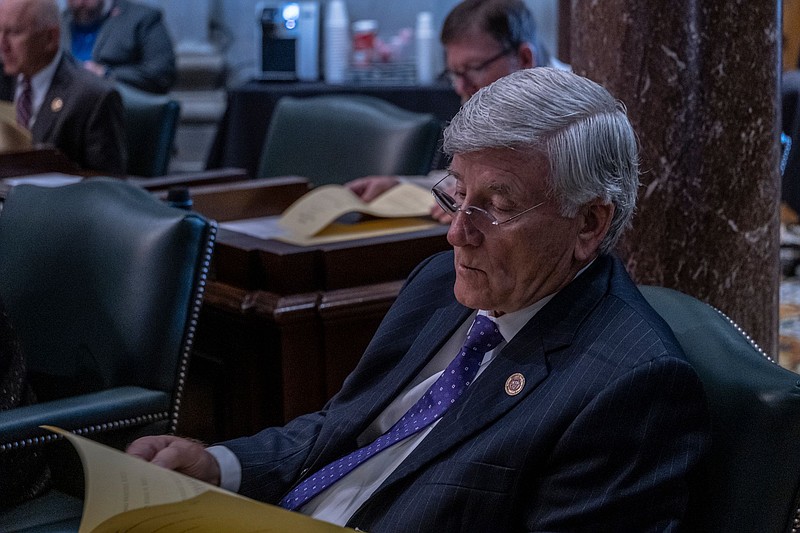Concerned that longtime Community Corrections providers were pushed out of the bidding process by Gov. Bill Lee's administration, Tennessee lawmakers are set to hold hearings to delve into changes that circumvented the legislature.
State Sen. Todd Gardenhire, a Chattanooga Republican who co-chairs the Fiscal Review Committee, confirmed he will schedule meetings this summer so legislators can respond to a move by the Tennessee Department of Correction to modify bids for contracts on decades-old Community Corrections services. In short, Gardenhire believes the intensive felon supervision program was "working well," and he wants to know why the state is changing it.
Based on concerns raised by several senators, Gardenhire said Tuesday he wants the state to explain why it took a new direction that caused some Community Corrections programs not to bid for contracts.
In 2021, the Lee administration tried to do away with the Community Corrections program, but the legislature rejected the move even as it approved the governor's criminal justice reform bill. Lawmakers say the administration's efforts through the bidding process amount to an end-run of the General Assembly.
The Fiscal Review Committee typically reviews no-bid contracts, but it also has the authority to look at these types of requests for grant proposals.
Gardenhire said he is seeking information from the Department of Correction and could be setting hearings for August and September.
The state changed the types of services sought so much that Madison County Community Corrections and Knox County Community Corrections declined to bid. The East Tennessee Human Resource Agency also lost Community Corrections services in 18 counties.
The Tennessee Department of Correction contends it didn't eliminate Community Corrections and is simply redirecting its efforts through day reporting centers, intensive outpatient treatment facilities and residential treatment. The cost of the program is to remain at $13.8 million for 14 grants, rather than 16.
With the new grant contracts for day reporting centers or in-patient and outpatient treatment, Community Corrections programs cannot supervise offenders, and the state won't pay for supervision, even if the court orders it.
(READ MORE: Nearly half of Tennessee prison staff jobs are vacant)
Under the program the legislature adopted in 1985, nonprofit and local government agencies work with about 7,000 felons who either don't qualify for probation because their sentences were too long or they flunked probation and likely were bound for prison. Judges sentence them to Community Corrections to keep them out of prison and functioning in society.
Old contracts ended June 30, and new ones started July 1, but Madison County Community Corrections, which is part of the local government, will continue offering services through a 90-day extension.
State Sen. Ed Jackson, R-Jackson, said multiple matters need to be resolved in scaling back or eliminating Community Corrections and shifting offenders to state probation, which isn't nearly as intensive.
He's worried about fair treatment for every offender and wants to know if the Department of Correction has enough officers to give cases the attention they need.
"Some of the offenders under Community Corrections, they're going to have to maybe end up going back to court. Will they have to go to jail or will they go to the Department of Correction? There are some questions about a lot of that," Jackson says.
Judges, district attorneys general and public defenders are asking how these changes will affect sentences and services, as well, Jackson said.
Madison County Community Corrections supervises about 700 offenders in three counties, about 400 of whom are actively reporting. The others are in some form of treatment or being sought on warrants.
State law still contains sentencing measures for Community Corrections, and Terry Bell, director of Madison County Community Services, predicted clogged courts and offender lawsuits as a result.
"It's an affront to due process," Bell said. "And due process is what separates us from chaos."
Supervision is much more intensive under Community Corrections than under the state's probation program, he said. Offenders also receive credit for each day they report for Community Corrections supervision.
Legal issues stemming from agreements reached in court will surround thousands of cases, Bell said.
For instance, he is uncertain what will happen with people who were sentenced as habitual motor vehicle offenders, a charge that no longer exists.
Numerous offenders over the years were turned over to Community Corrections from state probation because judges didn't trust Tennessee's probation officers to handle cases, he said.
Bell argued that the Tennessee Department of Correction doesn't have the authority to declare that be moved to a different jurisdiction. He said the change was designed to get rid of Community Corrections, not improve the treatment of felons.
Further, Bell said the "holy grail" of the contract change is to "remove judicial authority in violations," even though judges have the constitutional authority to decide how offenders' cases are handled.
"They want to be able for TDOC, by policy, to have all of these array of sanctions, and on top of that, have the ability to hide what's going on with the offenders and to not violate them," he says. "The intent is to reduce the prison population regardless of what is required to do it. We are only a sideshow to a reduction in felony incarceration."
Interim Correction Commissioner Lisa Helton is supposed to be reviewing the matter, according to Republican Sen. Richard Briggs of Knoxville.
Read more at TennesseeLookout.com.
